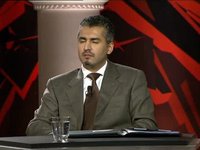This House believes that political Islam is a threat to the West
Sunday January 18 2009
MOTION REJECTED
by 49% to 51%
Transcript
Order of speeches
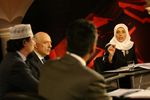
Introduction
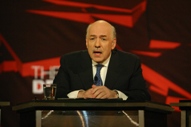 Ladies and gentlemen, a very good evening to you and welcome to the latest in our series of Doha Debates coming to you from the Gulf State of Qatar and sponsored by the Qatar Foundation. Political Islam has been back in the spotlight with Hamas battling Israel in the Gaza Strip, but where does that leave the scores of other Islamic political movements, many integrated in countries around the world? Some will argue that the vast majority have renounced violence and are therefore no threat to anyone. Others claim that whenever Islam is politicised, it should be treated as a serious danger. Whatever the case, is the international community now more frightened of Islam than it should be? It's with those questions in mind that we look beyond the latest conflict and offer you tonight's motion: "This House believes that political Islam is a threat to the West." Well, on our panel, four Muslims with very different views of the subject. Speaking for the motion, Maajid Nawaz, a former leader of the UK branch of the Islamist party, Hizb ut-Tahrir. The group is now banned in Britain and Mr. Nawaz was imprisoned in Egypt for four years. He's now director of the Quilliam Foundation which seeks to counter extremism and he also acts as adviser to the British government. With him, Yahya Pallavicini, an Italian imam at the al-Wahid Mosque in Milan and vice-president of the Islamic religious community in Italy. Since 2000, he's served on the board of the Islamic Cultural Centre and taken part in numerous interfaith and educational initiatives. Well, against the motion, Shadi Hamid, an academic who is director of research at the Project on Middle East Democracy and Hewlett Fellow at the Centre for Democracy, Development and the Rule of Law at Stanford University. His research has focused on Islamic political groups and their participation in the democratic process. And with him, Sarah Joseph, editor of the Muslim lifestyle magazine Emel, and a prominent advocate of interfaith dialogue and women's rights. Since becoming a Muslim twenty years ago, she's lectured widely on Islam and served as a member of the British Home Office Task Force on Extremism. Ladies and gentlemen, our panel. [Applause] And now let me call first on Maajid Nawaz to speak for the motion.
Ladies and gentlemen, a very good evening to you and welcome to the latest in our series of Doha Debates coming to you from the Gulf State of Qatar and sponsored by the Qatar Foundation. Political Islam has been back in the spotlight with Hamas battling Israel in the Gaza Strip, but where does that leave the scores of other Islamic political movements, many integrated in countries around the world? Some will argue that the vast majority have renounced violence and are therefore no threat to anyone. Others claim that whenever Islam is politicised, it should be treated as a serious danger. Whatever the case, is the international community now more frightened of Islam than it should be? It's with those questions in mind that we look beyond the latest conflict and offer you tonight's motion: "This House believes that political Islam is a threat to the West." Well, on our panel, four Muslims with very different views of the subject. Speaking for the motion, Maajid Nawaz, a former leader of the UK branch of the Islamist party, Hizb ut-Tahrir. The group is now banned in Britain and Mr. Nawaz was imprisoned in Egypt for four years. He's now director of the Quilliam Foundation which seeks to counter extremism and he also acts as adviser to the British government. With him, Yahya Pallavicini, an Italian imam at the al-Wahid Mosque in Milan and vice-president of the Islamic religious community in Italy. Since 2000, he's served on the board of the Islamic Cultural Centre and taken part in numerous interfaith and educational initiatives. Well, against the motion, Shadi Hamid, an academic who is director of research at the Project on Middle East Democracy and Hewlett Fellow at the Centre for Democracy, Development and the Rule of Law at Stanford University. His research has focused on Islamic political groups and their participation in the democratic process. And with him, Sarah Joseph, editor of the Muslim lifestyle magazine Emel, and a prominent advocate of interfaith dialogue and women's rights. Since becoming a Muslim twenty years ago, she's lectured widely on Islam and served as a member of the British Home Office Task Force on Extremism. Ladies and gentlemen, our panel. [Applause] And now let me call first on Maajid Nawaz to speak for the motion.
Maajid Nawaz
Speaking for the motion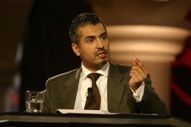
Thank you, Tim. Ladies and gentlemen, I greet you with the greetings of Islam, Assalaam aleikum wa Rahmatu Allah wa Barakatuh (peace and God’s mercy be upon you) and I begin in the name of Allah, the compassionate and the merciful. I want to emphasise at the beginning of this debate that this debate is not about whether Islam is a threat to the West. Islam is not a threat to the West. I am a Muslim, Imam Yahya Pallavicini is a religious scholar. We are not here to convince you that Islam is a threat to the West. I have memorised half of the Koran, I love Islam, and here is a man who dedicates his life to preaching Islam. I also want to assure you that we do not think that politics is a threat to any country. Of course we must engage in politics. Thirdly, I wish to assure you that we do not think that Muslims engaging in politics are a threat to the West or indeed to any country in the world. Muslims must engage in politics and that's part of my job. I advise the British government. Just before I came here, I sat with the Home Secretary, Jacqui Smith, and with the Community Secretary, Hazel Blears. A few days before that, I sat with David Milliband, the Foreign Secretary, advising them on the British government's foreign policy towards the crisis in Gaza and trying to push them to further condemn the Israeli atrocities in Gaza, so we must engage in politics. Rather the point here that I wish to make to you today is that to politicise Islam or indeed to politicise any religion, that is what is a threat to the West. It's when people wish to politicise the religion and that is what's going on today, people are politicising Islam, and therefore they engage in politics with a pre-defined ideological agenda, and it's not a religious agenda, because Islamism, otherwise known as political Islam, began in the 1920s, very much influenced by European political thought that emerged after World War One, and this is modernist agenda, it's an ideology. Therefore to politicise Islam and to engage in politics with a fixed agenda, using and utilising religious scripture to justify one's political stand - that is what I wish for you to vote against here today. And I want to assure you that I have a personal history in the movements that try to politicise Islam and use it for their own agenda. I spent thirteen years inside Hizb ut-Tahrir. I set up Hizb ut-Tahrir in Pakistan and in Denmark, and just as a, I'm very sorry, Tim, just at a correction, Hizb ut-Tahrir is not banned in the UK, and I was the one who tried to push the British government not to ban them, because we believe in engaging in debate and in dialogue, not in banning, not in military force to win this battle of ideas, but through debate and dialogue. I spent my time inside this organisation and eventually was imprisoned in Egypt. I have personally seen how this is a danger to the West because whilst I was in Newham College, my own propagandising of political Islam or Islamism led to a murder on campus, because we divided the students on the campus of Newham College along sectarian and religious lines, so they dehumanised the other. They saw the other as somebody that we not from them and very sadly that situation eventually led to a murder. I have now left political Islam behind me and dedicate myself to critiquing this modernist, irreligious [sic] ideology known as Islamism. I will end there by asking my friends on the opposition panel a very simple question. When they try and defend political Islam, I ask them to answer me: what are the aims of political Islam that should be any different to a Muslim engaging in normal politics without having any axe to grind or without having other agenda apart from caring for the people of his country? Please specify what those aims are that make them so distinct that they can't be engaging in normal political parties without pushing an agenda. Thank you very much.
TIM SEBASTIAN
Maajid Nawaz, thank you very much indeed. You say that politicising Islam is a threat, but what form does this threat take and how serious is it?
MAAJID NAWAZ
Well, as I said, from my personal experience, what happens is that people divide human beings along sectarian lines when engaging in politics, so they see themselves …
TIM SEBASTIAN
Yes, but that's an attitude of mind and that's the way they want to consider human beings - but where is the concrete threat from this?
MAAJID NAWAZ
So that happens as a result of that is that people see themselves as part of a collective and the other collective is seen as the “other”, and that begins a dehumanising process, and if we look at what's happening in the world today …
TIM SEBASTIAN
That dehumanises them?
MAAJID NAWAZ
It dehumanises the other side as well as everyone who opposes what they believe in.
TIM SEBASTIAN
But if that's the way to consider people, what's the threat?
MAAJID NAWAZ
Which is why we don't call for banning them, but the threat is that in reality Islamism has led to jihadism in the world. Every single terrorist jihadist organisation emerged …
TIM SEBASTIAN
There's no jihadism in Britain for instance, is there?
MAAJID NAWAZ
Of course there is. The former leader of Hizb ut-Tahrir, Omar Bakri Mohammed, set up Al-Muhajiroun. Al-Muhajiroun is an organisation that has now been banned in the UK. He sits in Lebanon, in Tripoli, and still preaches hatred into the UK. 7/7 and other atrocities have been committed by people that began their ideological careers in Islamist organisations that were not violent.
TIM SEBASTIAN
So simply preaching is the threat that you're worried about?
MAAJID NAWAZ
I'm very much worried about preaching hatred, and I think we all should be worried about preaching hatred. When we define ourselves as Muslims and everyone else are kafir, when we define ourselves as [inaudible] …
TIM SEBASTIAN
They're preaching hatred but who's listening?
MAAJID NAWAZ
Sorry?
TIM SEBASTIAN
I mean, you were thirteen years in Hizb-ut Tahrir.
MAAJID NAWAZ
That's right.
TIM SEBASTIAN
What kind of threat were you to the British way of life. Not much, were you?
MAAJID NAWAZ
There was a murder at Newham College and I was expelled from Newham College because of that murder. There was a real and perceived threat on the campus of Newham College and a poor Christian student was killed by somebody who appointed himself as our bodyguard on that campus..
TIM SEBASTIAN
And what are you saying, that because of the politicisation of Islam, that's likely to continue?
MAAJID NAWAZ
Yes.
TIM SEBASTIAN
Murders are likely to continue, and multiply?
MAAJID NAWAZ
Yes, sadly that's the situation.
TIM SEBASTIAN
As far as you're concerned, that's the concrete threat?
MAAJID NAWAZ
Sadly that's the situation and all jihadist organisations have emerged from Islamist organisations.
TIM SEBASTIAN
Maajid Nawaz, thank you very much indeed.
MAAJID NAWAZ
Thank you.
TIM SEBASTIAN
Now let me ask please Shadi Hamid to speak against the motion.
Shadi Hamid
Speaking against the motion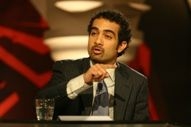
Well, the groups that Maajid are talking about are simply not representative of political Islam. Hizb-ut Tahrir, Al Qaeda, jihadist groups - this is not what we mean when we're talking about political Islam. These groups have tiny constituencies and no mainstream legitimacy. Let's look instead at the largest, most influential Islamist groups in the Middle East. The Muslim Brotherhood in Egypt and Jordan, the PJD in Morocco, the AK Party in Turkey, the ICM in Kuwait. All of these groups have fulfilled two very important conditions: they've renounced violence and they've committed themselves to the democratic process. Not only that - the vast majority of Islamist groups in the region have accepted many of the foundational aspects of democracy: alternation of power, popular sovereignty and protection of minority rights. Also, Islamists are increasingly interested in reaching out to Western audiences and even Western government officials. The former Secretary General of the PJD in Morocco, Saad Eddine Othmani, came to Washington for a tour in May 2006. Who invited him? Who sponsored his visit? The US State Department. Two of America's closest allies in the region, Turkey and Iraq, who are they led by? Democratically elected Islamist parties. If Islamists are such a threat to the West, why are they so intent on co-operating with the West? Even on an issue as contentious as Israel, in my interviews of Muslim Brotherhood leaders in Egypt and Jordan, some of them are even willing now to say that they're willing to accept Israel's existence as part of a two-state solution. Essam al Erian and Ibrahim El-Houdaiby, two prominent members of the Muslim Brotherhood in Egypt, even went so far as to write op-eds in the major Jewish American newspaper in the US, The Forward, so I mean, that's a pretty big deal in my view. In short, on the key indicators that the West cares about, that
Western policy-makers care about, Islamists have moderated significantly, that's the point I'm trying to convey. I'm not here to defend political Islam. They are not liberals, they're very socially conservative, and when I sit down with Brotherhood leaders, often times they'll say things that make me feel very uncomfortable, but this debate is not about whether American liberals like me, or British liberals like Maajid feel comfortable with Islamism. This debate is about whether Islamists are a threat to the West, and clearly they are not.
TIM SEBASTIAN
Shadi Hamid, thank you very much indeed. [Applause]. How about Islamist groups like Hamas and Hezbollah for instance? I notice you didn't talk about them. Are they moderating and reaching out to Israel and the West?
SHADI HAMID
No, they aren't, but ...
TIM SEBASTIAN
No threat from them at all?
SHADI HAMID
I don't think that Hamas provides a substantive threat to Israel, because ultimately there's no way Hamas can militarily defeat Israel, so at some point or another, Hamas and groups like it will have to accept Israel as a fact and as a reality.
TIM SEBASTIAN
And what do you think the effects of the recent fighting are going to be on political groups who look to Hamas, who look to Hezbollah?
SHADI HAMID
I don't think there will be much radicalisation. Islamists have shown time and time again that they're committed to a moderate path ...
TIM SEBASTIAN
Except for these.
SHADI HAMID
... in places like Egypt, Jordan and Morocco.
TIM SEBASTIAN
Except for these groups. Hamas has not shown that. Hezbollah has not shown that.
SHADI HAMID
Well, Hamas is not representative of political Islam at large. Hamas and Hezbollah are part of very specific circumstances.
TIM SEBASTIAN
Why, because it doesn't fit your convenient definition? It's still part of political Islam.
SHADI HAMID
No, these two groups, their raison d'être is a military one. These are groups that were founded to provide a military purpose. They're not political groups like most others in the region.
TIM SEBASTIAN
For heaven's sake, they fought an election and won. How much more of a political group can you have than that?
SHADI HAMID
They never renounced violence and the vast majority of Islamist groups have renounced violence, and if those are the majority groups, we should focus on them.
TIM SEBASTIAN
That's not a definition of an Islamist group, is it, that it renounces violence, is it? There are plenty of Islamist groups that haven't renounced violence.
SHADI HAMID
That's true, but as I said, the majority has gone in a different way, and as I said, Hamas does not provide a threat to the West, it's not a threat to America and ultimately it's not a threat to Israel. They won't be able to do anything to Israel ultimately.
TIM SEBASTIAN
So the picture is selective though - some are moderating, some aren't.
SHADI HAMID
I mean, there are some groups that haven't moderated, but the vast majority have moderated.
TIM SEBASTIAN
All right, Shadi Hamid, thank you very much indeed. Now could I ask please Imam Yahya Pallavicini to speak for the motion.
Yahya Pallavicini
Speaking for the motion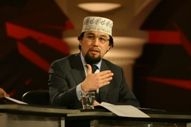
Thank you. Besmi Allah Al Rahman Al Rahim. Assalaam aleikum. Wa Rahmatu Allah Ta'ala wa Barakatuh. (In the name of God, the most gracious, the most merciful) I personally agree that this motion is very important and that Islam, political Islam, is a threat for the West, is a threat for the East, is a threat for Islam, is a threat for Muslims and for all believers and citizens, as any kind of misleading interpretation of politics and as any kind of misleading use of religion. What concerns my first point and my first concern, which would be probably the Muslims living in the West, I believe that their strategy, their propaganda, their activities, are harming and are a threat for the West, because they are somehow brainwashing the new generations with a utopia of an Islamist revolution. And on the second line, they are somehow promoting an alternative, artificial society that is leading to ghettoisation on the basis of misleading interpretation of sharia, at least to parallel and shadow societies, and unfortunately moreover they are trying to confuse the ignorance, or the perception of true Islamic traditional, sacred wisdom, trying to monopolise and making believe that they are acting for the interest of the community, of the Islamic umma, and in doing so, they have been using the victimisation approach or the arrogant approach, and trying to in this way have the legitimacy of their propaganda which is according to my masters a worldly propaganda that has no spiritual, sacred dimension as an inspiration, and no concrete political vision for the benefits of the community, of Western civilisation, of humanity. This is probably part of the concrete strategy that I've been unfortunately witnessing and trying to help the new generations to overcome these negative tendencies. This is only unfortunately probably the first steps of a concrete action of political Islam, but if we think of, just to give an example of the Taliban - we do not want, we do not believe that the holy messengers, our prophet, allows to destroy the cultural heritage of the Buddhist temples or the Buddhist statues. We do not believe that in any way the message of the prophet has allowed women to be forced to be wearing burkas or not having any education, or being the object of honour killing. We want to work in order to prevent this misleading use of religious interpretation and safeguard the correct, holy, spiritual and peaceful and just meaning of Islam.
TIM SEBASTIAN
Imam Pallavicini, thank you very much.
YAHYA PALLAVICINI
Please. [Applause].
TIM SEBASTIAN
Your threat from political Islam seems a little vague. People are trying to brainwash other people, people are promoting an alternative society. That's a pretty vague threat, isn't it?
YAHYA PALLAVICINI
I don't think so.
TIM SEBASTIAN
Does this worry you so much?
YAHYA PALLAVICINI
It worries me because I see ...
TIM SEBASTIAN
All around the world people are promoting alternative societies, people are trying to get their ideas across. It's not always brainwashing, is it? Just because people want to politicise Islam, why is that such a threat?
YAHYA PALLAVICINI
No, this is misleading the sacred principles of religion, trying to legitimise violence in order to have homologation of society ...
TIM SEBASTIAN
It's not always promoting violence, is it, political Islam? It may be promoting a caliphate, it may be promoting sharia law, it may be asking Muslims not to participate in the democracies in which they find themselves, but it doesn't have to be violence, does it?
YAHYA PALLAVICINI
No. To promote sharia law out of its context is a misleading use of sharia as the sharia courts and the sharia courts ...
TIM SEBASTIAN
But it isn't much of a threat, is it?
YAHYA PALLAVICINI
No, this is a threat because if you think that women are prevented [from receiving] education in the sharia schools in Afghanistan from the Taliban regime, this does not correspond to Islam, this is political Islam and we do not want those kind of schools, those kind of risks for our women, sisters and citizens in the West. This is a threat, and honour killing is a very concrete example as any kind of misleading interpretation where apologetic idealisation of Islam is actually taking the place of a true spiritual dimension where Islam, as all other religions, have taught believers to co-operate and to be educated and to try to help each other for a better future for humanity and this is not the agenda of political Islam.
TIM SEBASTIAN
All right, Imam Pallavicini, thank you very much indeed.
YAHYA PALLAVICINI
Thank you.
TIM SEBASTIAN
Now
please let me ask Sarah Joseph to speak against the motion.
Sarah Joseph
Speaking against the motion
I begin in the name of God, the merciful, the most kind. Salaam aleikum. All Bonds and bogeymen and agendas and monopolies, aren't they scary? I'd be scared, if I believed it. I'm against this motion because simply it creates a simple binary struggle between "political Islam" and "the West", as if there is one single entity which is "political Islam" and one single entity which is "the West". Graham Fuller, vice-chairman at the CIA, he said: "You know, Islamism includes Osama Bin Laden and the Taliban and moderates and liberals - in fact it can be whatever Muslims want it to be." It can be whatever we want it to be, whatever we choose to define it. I'm English, I'm British, I'm part of the West. I'm not threatened by people for whom faith and politics are connected richly, passionately. Politics and faith have always pl
ayed an important part in my life, first as a Christian, and for over twenty years, as a Muslim. I'm not scared of people who talk politics and religion. I grew up with the words of Gandhi. Gandhi said: "Those who say religion has nothing to do with politics do not know what religion is." In fact, I grew up in the anti-apartheid cause with heroes like Bishop Desmond Tutu who fought the racist regime, apartheid regime, in South Africa, and he said, so beautifully: "It's the powerful that complain we're mixing religion with politics. The poor - they never complain I'm being too political." When I embraced Islam in the late 1980s, the political and social justice movements which had moved me so much as a Christian, found resonance in the beauty and life-enhancing qualities of Islam. Islam has something to say and something to offer in our lives today, including the political arena. Why should we be excused, excluded from it, when we have Christian Democrats, when they're allowed, and Christians are allowed to bring faith and their religion together? Why should we be excluded? Feeding the hungry is a religious exhortation, but it's also a political act. Protecting the orphan is a religious exhortation. It's also a political act. Speaking for the oppressed is a religious injunction, it's a political act. Speaking to the oppressor, which is what so many of these Muslim groups are actually doing, is a political act, and they are perhaps sustained by their faith in speaking to so many. Reject this motion, reject this motion, and instead embrace this opportunity which we have tonight, an opportunity we have to the global political discourse, as Muslims, on those terms, and generated by our faith, and let us be the change that we want to see in the world.
TIM SEBASTIAN
Sarah Joseph, thank you very much indeed. So you see no threat from political Islam in Britain, where you live?
SARAH JOSEPH
No, I don't actually. What I see ...
TIM SEBASTIAN
The Conservative Party did. In 2007 they drew up a report in which the threat of what it called political Islam was compared to that of Soviet-backed communism.
SARAH JOSEPH
Well, you know what, I interviewed David Cameron in relation to ...
TIM SEBASTIAN
So he got it wrong?
SARAH JOSEPH
Well, and he admitted he got it wrong actually. In Emel magazine, David Cameron actually admitted ...
TIM SEBASTIAN
The whole report was wrong?
SARAH JOSEPH
I didn't write the report, you know, by the end of it, it was like: "Well, we don't want to call it Islamism ..."
TIM SEBASTIAN
I know you didn't write it. Did you read it?
SARAH JOSEPH
No, that's what David Cameron said by the end of this interview: "Well, I didn't write the report." He was just trying to call political Islam, you know, first it was political Islam: "Don't want to call it that, don't want to call it Islamism." He ended up calling it ‘Qadawi-ism'.
TIM SEBASTIAN
But where they say: "Considerable pressures are being exerted on Muslims in Britain, propagators in the UK of political Islam which exploits a contested version of belief for political ends, are active and influential in Muslim communities." Is that right? Is that wrong?
SARAH JOSEPH
I can bring you Muslims throughout the United Kingdom who have been inspired, been inspired by groups even like, who have read Milestones by Sayed Qutb, who have been inspired by the Muslim Brotherhood, been inspired by Jemaah Islamiah. They are senior civil servants today, they are engaged in some of the highest positions in the government, some of the highest positions in the media. Just because we have examples of an extreme group like Hizb-ut Tahrir which is, you know, as Shadi said, really not representative of what political Islam can and is across the world, we see time and again people who actually, some of the most passionately engaged people in the United Kingdom, who really are engaging with the government, have been people who have been inspired by a political dimension to their faith.
TIM SEBASTIAN
And a quarter of Muslims in Britain aged between 18 and 25 who were polled after the July 7th bombings, a quarter of them, who said that they thought that bombings were a good idea, that isn't a wake-up call to the effects of political Islam in Britain?
SARAH JOSEPH
I mean, let's dispute on that particular survey... I think was non representative. If you look at other surveys who have talked about, including in Britain, about engagement ...
TIM SEBASTIAN
Whether you dispute the survey or not, you don't think thousands of Muslims in Britain supported the July 7th bombings?
SARAH JOSEPH
Well, I think, you know, no, I do not think so. There are issues of extremism in Britain, there is extremism across the world, but that is not about political Islam, it's not about people who are inspired by that. They're terrorists, and let's face it, let's call them that, let's reject that, let's say absolutely: "We don't support that" but that is not what political Islam - that's not what it's all about.
Audience questions
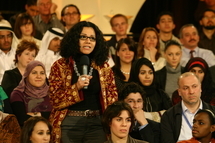 AUDIENCE (F)
AUDIENCE (F)
I'm Mona Eltahawy. I'm from Egypt but I live in the US and I'm a proud former speaker on the Debates. Thank you, Tim, and thank you for the panel. My question is to Shadi and Sarah. Sarah, you spoke very passionately and I admire your passion, but I'm passionately against everything you said. And my main question to you is, what if the oppressor is political Islam - how can I as a Muslim woman then fight that oppression? And for Shadi, you gave several examples of what you think is the way the Muslim Brotherhood has changed, and I have interviewed the Supreme Guide of the Muslim Brotherhood, the Deputy Supreme Guide of the Muslim Brotherhood, and I'm in touch with several young Muslim brothers who blog, and you mentioned Ibrahim El-Houdaiby who wrote an op-ed in the Jewish Forward. He wrote it in response to an op-ed that I wrote, saying that as an Egyptian liberal secular Muslim, I support everybody's right to take part in politics, but I don't think the Muslim Brotherhood supports my right to take part in politics. That's why Ibrahim responded. And you said that the Muslim Brotherhood has opened up and has met all the democratic values. Well, they wouldn't allow me to be President of Egypt, as a woman. They wouldn't allow a Christian Egyptian to be President of Egypt, because they're Christian, so that goes to your point about minority rights. When it comes to Shia rights, or non-Sunni rights, they also wouldn't recognise those rights because I have the Deputy Supreme Guide of the Muslim Brotherhood on record, telling me that he questioned that the Shia were the majority in Iraq.
TIM SEBASTIAN
Can we come to a question, please?
AUDIENCE (F)
So, how can you defend them and say that they've modernised and changed when on all your indicators they have failed. The Muslim Brotherhood has not changed. On the surface perhaps but essentially they are the same, and I consider them a threat to everyone.
TIM SEBASTIAN
Shadi Hamid.
SHADI HAMID
Okay, well, I'm not here to defend the Brotherhood, I said that. However, I went through the key indicators where the Brotherhood has changed over time. Let's focus on women's rights now. If you compare the Brotherhood discourse twenty years ago to the present day, there is a difference. Where there are Brotherhood parliamentary candidates who are women in both Egypt and Jordan - just a second, just a second - where in the majlis ash-shura of the Islamic Action Front in Jordan, in the beginning there were no women present on that body, now there are women in that body. I'm not saying that they have accepted what I would consider to be the necessary standard for respecting the full rights of women, but in their specific context, they have begun to make changes in that direction. I'll give you an example, and first of all ...
TIM SEBASTIAN
Quickly, because I want to come back from ...
SHADI HAMID
They're not going to deny your right to participate. Here's a 2007 programme for the Islamic Action Front in Jordan, and they say they're interested in "using the legislative process to increase the rights of women" and they support the right of women to have a job, the right to education, and the right to choose their husband. Granted that's not enough but it's a positive step.
TIM SEBASTIAN
Let me just ask Mona Eltahawy to come back on that - briefly, briefly.
AUDIENCE (F)
In Jordan, it's the Islamist party that has consistently stood against a woman's right to file for divorce. In Kuwait it was the Islamists who consistently fought against women's right to vote and run for office, and you mentioned within the Brotherhood itself, the democratic values you claim that they now espouse - young bloggers who criticise the leadership of the Muslim Brotherhood are told to choose: "Stop blogging or leave the Muslim Brotherhood." Where is the democratic value in that?
TIM SEBASTIAN
Okay, Sarah Joseph.
SARAH JOSEPH
You asked me, and I know you completely disagree with me, Mona, so that's fine, but you asked me simply what would I do if I disagreed with political ... At the end of the day, as Muslims, the Koran said be just, for justice is the closest thing to God-consciousness - be just, even if it be against yourself. So we have to be against ourselves and that's fine, but we also have to recognise when things, people are doing good works as well, and the welfare programme that goes on, I mean, at the end of the day I hear what you're saying about many things about the Muslim Brotherhood, but at the end of the day, when it was the massive earthquake, who was there first? Whose were the welfare programmes, who's putting into action what they truly believe? They've got faults, we've all got faults.
TIM SEBASTIAN
All right, I just want to bring Maajid Nawaz in here.
MAAJID NAWAZ
Thank you, Tim. I just want to say that Shadi seems to confess time and time again that he's not here to defend political Islam, which is a good thing, Shadi, because the most moderate example you've given is the Muslim Brotherhood, and the Muslim Brotherhood, I back up what's just been said there, the name you mention, Essam al Erian. I was in prison with him, I spent four years with him in prison, as well as their other leadership. I know what they believe in. They do not allow for a non-Muslim head of state, they do not allow for a woman head of state. Let's look at Hamas as an example again of a Brotherhood off-shoot in Palestine, aside from their resistance, look at their policies. Just before Israel invaded Gaza, Hamas had instituted a penal code where they said they would stone to death adulterers, they would lash people that drink, and they would chop off hands. On top of that, Zahar made a statement whereby he legitimised the killing of every single Jewish child in the world. This is the threat we're talking about. We're not saying that there aren't moderates and that there aren't extremists. What I'm saying is that the ideology of political Islam gave birth to jihadism, and finally I'm glad some of you agree that Muslims must engage in politics - that's not what we're saying. What we are disputing here is politicising Islam, that's a different thing. We are engaged in politics.
SARAH JOSEPH
People have been driven by their faith, motivated by their faith to go into politics but you ...
MAAJID NAWAZ
Like me, and like Yahya.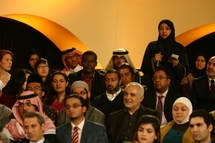 SARAH JOSEPH
SARAH JOSEPH
No, but it's more than that. For example the AKP, and it's more substantive than that when it actually comes down to the ground of actually creating government, it has to be more substantive than, you know, just chatting to militants. It's got to be ...
SHADI HAMID
Can I just clarify what you said here? I object to a lot of things that the Brotherhood says about women. Like I said, they aren't liberals. However, that doesn't make them a threat to the West.
TIM SEBASTIAN
Okay, all right. I'm going to take a question from the gentleman in the fourth row, you, sir. Yes. Just stand up and we'll get a microphone to you. If you could tell us where you're from, please.
AUDIENCE (M)
Salaam aleikum first. I'm originally from Palestine and I have a nationality of Jordan and I live in Saudi Arabia. My question is to Mr. Shadi. Mr. Shadi, you speak a lot about Brotherhoods in Jordan and Egypt. Just for your information, they are participating in the politics there, but regarding the rule of the politics of Jordan and Egypt, they reject some rules and when you talk about Hamas and Hezbollah, please refer to them as resistance and they are applying the political Islam, and the political Islam which applying it, that's cause a threat for the West, which is Israel, and that's why Israel make a war on Gaza, because they're going to defeat Hamas. Why? Because they applying the real political Islam. That's all, thank you.
TIM SEBASTIAN
Shadi Hamid, do you want to come in on that?
SHADI HAMID
There's nothing... to say that this is the real political Islam, I don't think violence, I don't think suicide bombing is the real political Islam or a good version of political Islam, and that's why it's promising to see the other examples in the region which are doing much more positive things and avoiding violence. I don't think Hamas and Hezbollah are really what we want to point to when we say this is a positive example.
TIM SEBASTIAN
Yahya Pallavicini.
YAHYA PALLAVICINI
Then finally we all agree. The question then that in the West, we do not want this threat to be exported. There might be reasons that are not religious, not Islamic, not sharia, that are not coincidence with the message of the holy prophet, that are not implementing any rule of our sacred doctrine, and that might have inspired in somehow some movements in the Middle East or in south-east Asia. This is not a threat or this it not a context that we want to have in the West, because it's neglecting the sacred principles of religion and it's neglecting the peaceful co-existence.. in respectful... between cultures and genders on an equal basis and with dignity as a priority and not as a competitive agenda in order to have the apologetic ideology of Islam, which is not any more recognised as a true, divine revelation.
TIM SEBASTIAN
Sarah Joseph.
SARAH JOSEPH
The scare-mongering of this side really is, it's too much. You look at the AKP in Turkey, you look at them as a party that have gone through and been inspired by their faith to contribute to the discourse, and what is that as a discourse - women can't even be muhajabah (a women who wears the veil) in Turkey and that is something that ends up getting supported by the European Union and the courts of the European Union, so here are a people, here's a party that wants to contribute, that wants to participate, that wants to come into the European Union as Turkey, coming into full citizenship, and they're denied that, and this scare-mongering, this polarisation, this Muslim on the one side, Islam on the other type of mentality ...
TIM SEBASTIAN
But not all parties are like the AKP, are they? That's a particular party.
SARAH JOSEPH
Well, the PAS (Parti Islam Se-Malaysia) in Malaysia. I go back to what Graham Fuller says in the CIA: "Islamism is what Muslims want it to be, it's what we want it to be, but it should be about the right to self-determine what we think our political systems in our country should be."
TIM SEBASTIAN
Okay.
MAAJID NAWAZ
But that's Muslims in politics, that's not Islamism. Muslims in politics are engaging in politics all over the world. The AKP - if the only standard for a party that's not a threat, is a party that's moved away from political Islam, then that proves my point, and Yahya's point.
TIM SEBASTIAN
Okay. We're going to take a question from the gentleman in the fifth row, there, you sir.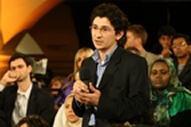 AUDIENCE (M)
AUDIENCE (M)
Thank you. My name is Ali from Eritrea. Both of the opposition and proposition, they are all against extremism - and we are all against extremism - but can you please explain what is the threat of political Islam? I mean, you mentioned that the participation of the woman in the, I mean the parliament or something like that, what is the threat in that to the West? Thank you.
TIM SEBASTIAN
Maajid Nawaz.
MAAJID NAWAZ
Okay, so those who believe that a woman is not human enough to be able to lead a state have dehumanised a woman. Those who believe that a non-Muslim is not human enough to lead a state have dehumanised a non-Muslim. That philosophy, present in Islamism from its beginning in the 20s, created the jihadist organisations around the world. The Muslim Brotherhood member, Abdullah Azzam, was Osama Bin Laden's teacher in Afghanistan; Sayed Qutb, the Muslim Brotherhood member, his brother, Mohammad Qutb was Osama Bin Laden's other teacher in Saudi Arabia - all jihadist organisations emanated from Islamist parties. The assassins of Sadat, who I spent time with in prison in Egypt, their teacher was Salem Rahal, a member of Hizb ut-Tahrir, a non-violent political Islamist organisation. My point is, when you dehumanise the other and say they're not human enough to lead the state because they're not Muslims, you divide people along sectarian lines.
TIM SEBASTIAN
Okay, all right, all right.
SHADI HAMID
Maajid, it would really be a mistake to conflate Al Qaeda and terrorist groups with the Muslim Brotherhood - in fact one of the fiercest opponents of Al Qaeda is the Muslim Brotherhood. Ayman Zawahiri is second-in-command, actually wrote a whole book accusing the Brotherhood of betraying the Islamic cause. He's even quoted as saying that the Brotherhood has lured thousands of young Muslim men into lines for elections instead of onto the lines of jihad, so Zawahiri is against the Brotherhood because they participate in the democratic process. And also Mark Lynch has made the argument that where the Brotherhood is strong, Al Qaeda has failed to gain a foothold, because the Brotherhood is able to channel the frustrations of young Muslims into practical politics instead of towards violence.
TIM SEBASTIAN
Okay, okay.
YAHYA PALLAVICINI
Do we have to have them instead of true Islam, instead of all the rights that all Muslims respectful of inner pluralism and spirituality should leave to the risk of this threat, because you're making the nuance between the extremist terrorist and the Muslim Brotherhood, who is just a political party, and that has no spiritual legitimacy, they have no agenda.
SHADI HAMID
I share many of your concerns, Imam, but that doesn't make them a threat to the West. People have the right to be a liberal.
TIM SEBASTIAN
Okay, we're going to have a question from the gentleman in the second row.
AUDIENCE (M)
Salaam aleikum. I'm from Kyrgyzstan which is in Central Asia. I have a question to the two gentlemen in favour of the fact that political Islam is a threat to the West. Well, first of all I do not really see what this threat really is if you mention 9/11 or London. We all agree that it's not political Islam which is causing, it's just regular terrorism, extremism etc. Now, if you believe that political Islam, which conveys actually good messages - for example Mohammed salla Allah alayhi wa sallam (peace be upon him) was the biggest [Muslim politician] - I believe, because Jews and Christians and whoever lived in peace under his rule, right? That is political Islam, and we cannot deny that Mohammed salla Allah alayhi wa sallam was a good politician in this regard. Now, if you believe that political Islam is a threat to the West, what do you suggest?
MAAJID NAWAZ
Thank you. First of all, so we don't mix up matters Muslims engaging in politics is absolutely a necessity, it's not a threat, it's not a problem, and the Prophet Mohammed salla Allah alayhi wa sallam (peace be upon him) was a civil leader, as demonstrated by the saheefat al Madina he signed, whereby he gave everyone equal rights. He engaged in politics as a human being, without a religious agenda. He treated everybody equally. That's not what we're talking about. We're not talking about Muslims in politics. Myself and Yahya and Sarah, and I assume Shadi as well, are engaged in politics as Muslims. What we're trying to highlight is those who come to politics with an ideological agenda that happens to be called political Islam in this debate - I call it Islamism. What is the threat from Islamism? It's dividing human beings along sectarian lines and along religious sectarianism. That is a threat because it dehumanises the other. When you say that somebody cannot become president or a head of state because they're not Muslim, you're not recognising he is equal to you, and that begins a process of dehumanisation which can end up in violence and there's a threat there, and that's played out in the streets of the UK. In the 90s when I joined Hizb ut-Tahrir, there was no terrorism. There was a growth, a very rapid growth, of Islamist parties that were not violent. From those Islamist parties, it's a matter of history, terrorist parties emerged. They share the same philosophy. Yes, the Brotherhood criticised Al Qaeda.
TIM SEBASTIAN
So you helped to create terrorism?
MAAJID NAWAZ
I helped to create the threat in the West, and that's why I'm dedicating myself to pulling that back, and I'm very regretful for that. People that I trained in Hizb ut-Tahrir went on to become terrorists. One of them took flying lessons, and this is just the fact of the history of the growth of Islamist parties in the UK.
SARAH JOSEPH 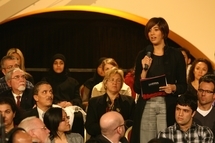 Maajid, look, at the end of the day, Maajid, you were in one extremist group, and look, at the end of the day, I've dealt with HT on campus. They have no regard,
Maajid, look, at the end of the day, Maajid, you were in one extremist group, and look, at the end of the day, I've dealt with HT on campus. They have no regard,
they rip down your posters, they'll ban the Muslim Brotherhood, they are really objectionable, you know, you don't want mess... and it's really not very good fun, and I spent the early 1990s dealing with HT on campus. But you've gone from one extremist position to another extremist position. You've just said that the prophet salla Allah alayhi wa sallam was a civil leader as if he didn't have anything to do with Islam, the prophet salla Allah alayhi wa sallam didn't bring Islam to the political arena at all - oh my God. You know, it's absolutely ridiculous, this idea that you can't be, why do we not allow ourselves the right to bring our spirituality to the table of the political discourse? Why do we deny ourselves the right to bring our faith, our guidance, what we can offer to the 21st century? Why do we believe that this wonderful Western political model...
TIM SEBASTIAN
Maajid Nawaz, come back on that will you?
MAAJID NAWAZ
You keep mixing the two points of Muslims engaging in politics without coming with an agenda and those who have politicised Islam. What we're talking about here is those who have politicised Islam. Yes, Hizb ut-Tahrir is one element of Islamism, but the Brotherhood, as we've said time and time again - you emphasise you're not here to defend them, yet then you say they are a moderate example of political Islam. Which one is it? Are you here to defend the Brotherhood and their disallow of non-Muslims to be head of state and women to be heads of state, or are you not here to defend them?
SARAH JOSEPH
I am here to defend a Muslim's right to allow to bring their face to the table of the political area, in whatever way that they want to do so.
MAAJID NAWAZ
Sarah, that's not the dispute because we're all engaged in politics.
SARAH JOSEPH
It is exactly the point.
MAAJID NAWAZ
We're all engaged in politics, that's not the dispute. The dispute is, are you here to defend the Brotherhood, who by your own saying and your own admission, are examples of moderate political Islam? Are you here to defend them or not? You have to decide.
SHADI HAMID
I said no very clearly.
MAAJID NAWAZ
Then the debate's over.
SHADI HAMID
No, no, it's not. No, let's clarify what this debate is about.
MAAJID NAWAZ
Who is more moderate in your example than the Brotherhood?
TIM SEBASTIAN
Maajid, please let him speak, please.
SHADI HAMID
Yes, the Muslim Brotherhood in Egypt did say that women cannot be the heads of state. That is a problem and I'm 100 percent against that. That does not make them a threat to the West, that is what this debate is about.
TIM SEBASTIAN
Okay, I'm going to take a question from the lady right at the back, please.
AUDIENCE (F)
Thank you, good evening. I'm from Pakistan. I've lived in Qatar all my life. I would like to ask a question from the panel for the motion. If you go back to when Europe was working towards parliamentary diplomacy and progress and getting away from feudal monarchy and the reformation, the Europeans resorted to religious fundamentalists, so why is it now unacceptable for a nation such as Pakistan, which is quite young at this point and was created on religious grounds to give the Muslims a land where they're free to practise their religion. Why is it wrong for them now to involve Islam in their politics and base their constitution on the laws of Islam?
TIM SEBASTIAN
Imam Pallavicini, this is in your court.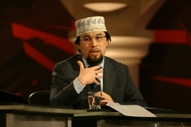 YAHYA PALLAVICINI
YAHYA PALLAVICINI
I would turn the question on the West, which is the scenario where we are asked to debate, and to give you a very concrete example, because you were mentioning of course the history of the development of democracy in Europe. My father who converted to Islam fifty years ago, fought the Nazi and Fascist coalition, and they wanted as an agenda to recreate the sacred Roman Empire, according to a spiritual, religious ideology, and they had on their belts 'Gott mit Uns' which means God is with us. This is exactly the same ideology that some in political Islam are moving, and they are using, with a false interpretation, religion as an emotional weapon in order to have power in the West as in the East, and this is a threat.
TIM SEBASTIAN
And in Pakistan specifically?
YAHYA PALLAVICINI
Well, in Pakistan we have unfortunately even some examples of this kind. This does not mean, of course, that one should actually try to find a solution according to a free political debate. What we are mentioning here is that we would like to avoid to have this threat of a misleading interpretation of Islam, not according to a political interpretation, according to an incorrect political interpretation, according to a non-legitimate religious interpretation.
TIM SEBASTIAN
Okay, all right. I'm going to let Sarah Joseph in here.
SARAH JOSEPH
Look, there's no doubt that people misuse religion. Let's face it, the Nazis misused religion, but that doesn't mean that religion when it gets engaged in the political process is all negative. In South Africa, the white South African administration used a sort of Calvinist-Protestant extremism to persecute and oppress the blacks. Bishop Desmond Tutu used religion to obtain his freedom. I go back to Gandhi that if you don't understand that religion and politics are connected, ultimately connected, you don't understand religion.
SHADI HAMID
There's another issue here that possibly even a majority of Muslims are sympathetic to political Islam. According to a 2005 University of Jordan poll, 61 percent of Egyptians believed that the sharia should be the only source of legislation, another 33 percent of respondents believed that sharia must be one of the sources of legislation. If we define Islamism as the willingness to see Islamic law play a larger role in society, 94 percent of Egyptians are Islamist or at least sympathetic to it. Are you trying to say they're all a threat to the West?
MAAJID NAWAZ
Well, since you ask me the question, may I respond? I think, Shadi, you should be on this side because you yourself have written that "if we now know who our enemy is, Islamic extremism or Islamic totalitarianism, depending on your preference, it is not clear we know who our friends are". Now, I think that you agree with me when recognising that these are illiberal actors in politics abusing Islam to justify their positions. I'd like to ask you a question I asked at the beginning that none of you have answered yet. In the West, when Muslims engage in politics which I don't disagree with, Sarah, when Muslims engage in politics, what are the aims that you would say distinguish Islamists from normal Muslims engaging in politics? What is the programme of political Islam that would distinguish you from any other normal Muslims? Please answer that question.
SHADI HAMID
Islamists have a specific interest in seeing certain aspects of Islamic law ...
MAAJID NAWAZ
Like what?
SHADI HAMID
... being implemented in the legal process.
MAAJID NAWAZ
Please give me an example, like what?
SARAH JOSEPH
Let me give you ...
TIM SEBASTIAN
No, can he finish, he was asked a specific question.
SHADI HAMID
Okay, well let's talk, if the Muslim Brotherhood comes to power in Egypt, this is what I suspect.
MAAJID NAWAZ
In the West, Shadi, in the West. My question was, in the West what are the aims of Islamists that distinguish them from people like me who engage in politics using the normal structures that are at present forming, what is the difference, what should distinguish them?
SHADI HAMID
Well, Maajid, you know about the British context or the European context much better than I do.
MAAJID NAWAZ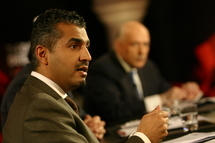 Please answer my question, Shadi. What is it that distinguishes an Islamist and his aims that I can't call for as a normal citizen?
Please answer my question, Shadi. What is it that distinguishes an Islamist and his aims that I can't call for as a normal citizen?
SHADI HAMID
Like I said, they want to see certain, what they consider to be Islamic law, have a larger influence on public policies.
MAAJID NAWAZ
You want Islamic law to have a larger influence in the West? Like cutting off hands?
TIM SEBASTIAN
Okay. I think he's answered the question as best he can. We're going to move on to another question, please. Lady in the row up there.
AUDIENCE (F)
Good evening. My name is Sarah, I'm originally Iraqi. My question is to Mr. Maajid. You mention time and time again dividing humans on a sectarian basis, which sounds to me more like a threat on Muslims. How does that impact the West, whether or not Muslims are divided amongst themselves? Take Iraq, for instance, the conflict between the Sunnis and the Shi'ites, how does that impact the Americans' presence in Iraq? Thank you.
MAAJID NAWAZ
Well, I'm glad you asked me that question, because it starts as a threat, Muslim on Muslim discrimination, because it's deemed that your creed is not sufficiently authentic enough, and so the discrimination begins between Muslims and among themselves, but then of course non-Muslims' creed is not just insufficiently authentic, it's wholly illegitimate. If you organise yourselves along political lines based upon whether your creed is legitimate or illegitimate, your belief in God and your belief in the hereafter, whether that's deviant or not deviant, and then you organise yourselves politically along those lines, a process of the dehumanisation of the other occurs. That's what we've seen played out in the streets of the UK.
TIM SEBASTIAN
Let me see how she reacts to that. Do you want to come back on that? Are you convinced?
AUDIENCE (F)
Actually I do. I still don't see how the conflict between two Muslim sects would impact the West - directly impact it.
MAAJID NAWAZ
There's already a conflict in the West already. I mean you're speaking about Iraq, but it's... within the countries of the West, there is already a conflict, where people are either discriminating against other Muslims in the political arena, because they're not seen as sufficiently Muslim, or they're discriminating against non-Muslims or policies they are suggesting that are bad for Muslims and non-Muslims as a whole, such as trying to take the sharia and synchronise it with state law, something that Imam Malik, may I add, one of the founders of the Four Schools of Thought explicitly rejected when the caliph of his day asked him: "Can we take your book?" It was called al-Muwatta' ("The Approved"), you would have heard of this book, and he was asked: "Can we take this book and implement it through authority, through state authority?" and he said "No", because this would stifle creativity, innovation, otherwise known as ishtihad. It's bad for Islam, and it's bad for everyone else.
TIM SEBASTIAN
Thank you. We have a lot of questions. I'm going to go to the gentleman in the third row.
AUDIENCE (M)
Thank you very much, good evening. I am from Syria. Speaking about countries that embrace Islam or Islamic sharia as the major source of their constitution such as Saudi Arabia and Iran, that embrace Islam as an ideology for the country - can't we take these as an example of a threat to the West? And if we think about it in a different way, why is Iran perceived as a threat when Saudi Arabia is not? Thank you.
TIM SEBASTIAN
Who'd like to take that? Sarah.
SARAH JOSEPH
Well, I think that's what actually Richard Hass called ‘democratic exceptionalism'. He was a former US ambassador, and ultimately democratic exceptionalism - we accept this one and we don't accept that one, or we like this one, perhaps that one, it's tinkering, you know, it's the game play that unfortunately goes on. I think the point this evening, and why I want you to reject this motion is, if we don't make room in the political arena for those who want to have a political discourse based upon their faith, not only is this non-democratic, not only is it against the democratic principles of the West that, you know, we want to espouse, we exclude them at our own expense. We have to find room because the simple fact is, as Graham Fuller of the CIA said, the simple fact is that political Islam, defined broadly as a belief that the Koran and the hadith have something important to say about the way society and governance should be ordered, remains today the most powerful ideological force in that part of the world.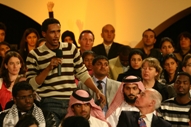 TIM SEBASTIAN
TIM SEBASTIAN
You like the CIA, don't you?
SARAH JOSEPH
Well, I just think, you know ...
TIM SEBASTIAN
You quote a lot from them.
SARAH JOSEPH
These guys, at the end of the day are meant to go out there, these guys are meant to go out there and find out who are the threats to the West. These guys are there looking for the bad guys, looking for the threat, and at the end of the day ...
MAAJID NAWAZ
There are bad guys.
SARAH JOSEPH
Of course there's bad guys in the world. These guys are out looking out there, looking for the threats to the West, and do you know what? They say that political Islam isn't actually a threat.
SHADI HAMID
Maajid, I'm not saying that there aren't bad guys. We're saying that bad guys are a minority of Islamists and the majority of Islamists are not ...
MAAJID NAWAZ
Please give me examples of the majority of the Brotherhood that we've just been speaking about - you don't agree with them and you're not here to defend them. Now, I find that quite amusing, because I think you should be sitting here. I hope in future we can work together.
TIM SEBASTIAN
Can you let him reply? You've made a point. Did you have something to say?
SHADI HAMID
Yes. In the democratic system, people have the right to have illiberal views. The Republican Party in America has strong Christian influences. They've supported torture over the last eight years of the Bush administration. They've been against equal rights.
TIM SEBASTIAN
They would take issue with that.
SHADI HAMID
Well, no, it's true, it's true. They're against equal rights for gays and so on and so forth. That's illiberal. That doesn't mean we should ban Republicans from participating, it doesn't mean Republicans are a threat to the West.
MAAJID NAWAZ
Shadi, I was the first to stand up in the UK to oppose banning even Hizb ut-Tahrir, which is why I corrected Tim in his introduction, sorry about that, but it's because I agree with you. They have the right to have illiberal views. That doesn't mean we consider those views a problem. Of course they're a problem. We don't ban them, we deal with them from debates such as this to expose what they really believe in. I was quoted in parliament by Gordon Brown, the Prime Minister of the UK, when asked about why he hasn't banned Hizb ut-Tahrir, he said: "Because Maajid Nawaz came out, being a member on their leadership and said we shouldn't ban them." That was my contribution to not banning Islamists to the UK. I agree that they should not be banned, but they should be exposed, they are a problem. Illiberal views are a problem, true or not?
TIM SEBASTIAN
We're going to take a question from the gentleman in the fourth row there.
AUDIENCE (M)
Thank you very much. My name is Daniel from New York City. I'd like to speak very specifically about a threat. Do you believe that Iran's nuclear aspirations and its support, economic and military support for organisations such as Hamas and Hezbollah, pose not only a threat to democracies in the Middle East such as Israel but also the Middle Eastern stability. Thank you.
TIM SEBASTIAN
Sarah Joseph.
SARAH JOSEPH
I think that there are nations out there who, you know, we don't like their politics, North Korea is perhaps another one.
TIM SEBASTIAN
No, but he asked a specific question about Iran.
SARAH JOSEPH
About Iran. Do I think that they're a threat? No, actually I don't think that they're a threat. I think that they are ultimately a government that we can make very scary stories about and we can say that they're illiberal, but actually if you look at many people that are coming out of Iran, no, I don't think that they're a threat, a substantive threat to the West, I really and truly don't. We might put them in our axis of evil, we might say: "No, let's go into Iraq and then let's go into Iran," but you know, who's more of a threat in this, who's actually committing more of the violence?
TIM SEBASTIAN
Can I just say, there's no threat if they've been lying about aspects of their nuclear technology for a long time?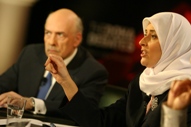 SARAH JOSEPH
SARAH JOSEPH
We have nuclear weapons in England, are we a threat?
TIM SEBASTIAN
I didn't say whether we have them or not.
SARAH JOSEPH
Israel has nuclear weapons, they're definitely, you know, a threat.
TIM SEBASTIAN
I said if they were lying about aspects of their nuclear ... That's not a threat?
SARAH JOSEPH
Well, I don't know whether they're lying or they're not lying. I haven't been in there, but at the end of the day ...
TIM SEBASTIAN
But the Atomic Energy Agency has and they've said that they've been lying.
SARAH JOSEPH
Iraq supposedly had weapons of mass destruction. We invaded their country saying: "You've got weapons of mass destruction." There were no weapons of mass destruction so then we said: "Well, we're here to create democracy and regime change."
SHADI HAMID
Just to mix things up a bit, I have to say on this point I disagree slightly with my partner. I do think Iran can be considered... is a threat actually, but they're a threat not because they're Islamists but because they're trying to get nuclear weapons and they're acting as an irresponsible power. It has nothing to do necessarily with their Islamism, it's that they have a very aggressive agenda in the region.
YAHYA PALLAVICINI
Just to make an example unfortunately, their position on the legitimacy of a pluralism in faith for concerns even the Jews is something that has no possibility of any legitimacy for what concerns Islamic principles, and what concerns the natural cultural of co-existence and pluralism and respect of diversity of faith in Europe, so this is a threat, because at the end of the day they are starting to have the monopoly of the Islamic leadership, they would like to, and they want to export it to the West because they do not have legitimacy in the East, and at the end of the day they will try to even have the legitimacy of belief, and so all the mainstream Muslims, all the great scholars of Islam in contemporary society, all the believers in Christianity and Judaism and all the non-believers will be all out because we will be discriminated because they are... if you're not sure that they are the threat, don't take the risk, because you cannot be naïve in putting at the same place the possibility of a true participation of believers in Islam into the political debate, and of false persons that are trying to use religion not for peace and not for spirituality.
TIM SEBASTIAN
All right, okay. We're going to take a question from the lady up there.
AUDIENCE (F)
I'm Indian by nationality but I've lived in the Middle East all my life. I'm not a Muslim but my question is for the proposition. I feel like there's one angle of the debate that hasn't been touch upon at all and the question's sort of remained unanswered. I believe that the West basically constitutes a secular society whereas the Arab world basically, the society in the Arab world is dominated by Islamic ideologies and views. In my opinion, the West is just not used to the fact that Islam is a dominating factor in society itself, and therefore the West might consider the differences between Islam and its own views as a threat to society, but it clearly hasn't been founded, the basis for the proposition documents haven't been founded at all. Why are there differences? Why are the differences in ideologies a threat to the West? Just because there is a difference in views and opinions, that would mean that every society that has a difference in opinion from another society in the world are threats to each other.
TIM SEBASTIAN
Imam.
YAHYA PALLAVICINI
Thank you for the question, it's very important, because this goes really to the subject on our responsibility as Muslim believers and scholars and preachers in the West, and actually the situation is as you have described - there is somehow a lack of preparation or knowledge of the variety of pluralism of faiths, and even the variety of possibilities of being religious or secular Muslims, and having also a variety of cultural and juridical and theological approaches within our Islamic community, but this variety has nothing to do with the deep difference between the varieties within the community that are a blessing for our community and the misleading use by some individuals that want to use Islam not to practise their faith, not only, not to witness their faith, but to change the world instead of changing themselves.
TIM SEBASTIAN
She wants to come back on you..
AUDIENCE (F)
So, the key word here is Islam. Political anything could be a threat to anything else. My question is, why is political Islam, what are the areas, the key factors in Islam, political Islam that are a threat? Are people using political Islam as an excuse for their actions or are they actually practising political Islam as threats to Western society?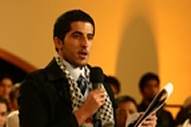 YAHYA PALLAVICINI
YAHYA PALLAVICINI
There are two options. Muslims are participating and have the duty and the responsibility and the freedom to engage in the contribution for the political development of society in the East and in the West, so this is the translation of a correct approach in intention, methodology and goal of a Muslim believer in politics. The difference, the great difference, is that on the other side you have an ideology that is using political purposes that have nothing to do with religion and at the end of the day they want to threaten the established system of democracy and of freedom, and even within the Muslims, in order to change, because they believe that Islam is the solution.
TIM SEBASTIAN
Okay, let me just go back to her, let me just go back. I want to go back to the questioner please and just ask her if she's convinced.
AUDIENCE (F)
I still don't understand how you justify your argument when you say it's political Islam. What is it about Islam that's threatening the West to such a great extent that we feel like it's important to debate about it?
YAHYA PALLAVICINI
Islam is not threatening the West, absolutely. Muslims are living in peace in the West. Islam, as Christianity, as Judaism, as all religions is part of the world, divine revelations, and believers that are sincere and honest in practice ...
AUDIENCE (F)
So people who use political Islam as an excuse, are they really using Islamism in the right way or is it just a cover?
YAHYA PALLAVICINI
Islamists are using Islam in the wrong way.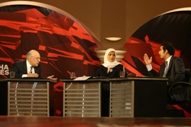 TIM SEBASTIAN
TIM SEBASTIAN
All right, thank you, thank you very much, thank you. We're going to have a brief comment. Shadi Hamid.
SHADI HAMID
This is very problematic, what you're seeing here. Imam Yahya, no-one has the right to say: "This person has a correct interpretation of Islam, this person has the wrong interpretation." Only God can judge that. In the end you have to let people express their views with full freedom, and if people want ...
YAHYA PALLAVICINI
That's what I'm doing, that's what I'm doing.
SHADI HAMID
In a democratic society people have the right to abuse religion. In America people have the right to abuse Christianity, people do it all the time in the US, and that doesn't make them a threat.
TIM SEBASTIAN
Excuse me, I'm going to exercise the right to go to a new question. Thank you very much. Lady in the second row.
AUDIENCE (F)
Assalaam aleikum. I'm half-Finnish, half-Syrian and I live in Denmark. Political Islam in itself is not a threat to the Western societies. We agree, I think both parties agree that there are some, you cannot speak about political Islam as one thing. People give political Islam meaning, and people give political Islam different meanings, so I think you have to agree on one point, and that is that some forms of political Islam are a threat to the Western societies, and some forms of political Islam are not a threat to the Western societies. [applause].
TIM SEBASTIAN
So you come down in the middle?
AUDIENCE (F)
If we conclude that political Islam in itself and always as the way it's been practised, is a threat to the Western societies, we are demonising a large group of Muslims, politically active Muslims, and I think that's wrong.
TIM SEBASTIAN
Since you've come down in the middle of the argument, some are a threat, some aren't, which way are you going to vote?
AUDIENCE (F)
Excuse me?
TIM SEBASTIAN
Which way are you going to vote?
AUDIENCE (F)
Where would I vote?
TIM SEBASTIAN
Yes.
AUDIENCE (F)
On that side (points to Shadi Hamid and Sarah Joseph)
TIM SEBASTIAN
Okay.
AUDIENCE (F)
Because I would always choose nuances... it's important. I mean, we cannot demonise ...
TIM SEBASTIAN
You'd give them the benefit of the doubt, would you?
AUDIENCE (F)
No. If some forms of political Islam are a threat to the Western societies, this is not the same as saying that political Islam is a threat to the Western societies. We have to distinguish, it's very important.
TIM SEBASTIAN
Maajid Nawaz.
MAAJID NAWAZ
Thank you for that comment. It's because of the nuances that I opposed the banning of organisations that are Islamist but are not violent, because I recognise, as does Imam Yahya, those nuances. The point we're making is that if the only criteria for when political Islam or Islamism refuses to become or ceases becoming a threat is when they move away from Islamism as an ideology and move towards democratic and liberal values, then I think that proves our point - that if you stick to or adhere to Islamism as an ideology, the most moderate example of which advocates that women and non-Muslims cannot become heads of state, that hands need to be lopped off for theft, that people need to be stoned to death, and that people need to be lashed for drinking - and that's the most moderate example of them - then I'm saying that's a problem.
TIM SEBASTIAN
Please. I just want to bring the questioner in and then I'll come to this side.
AUDIENCE (F)
Okay, I will answer shortly. I agree with you on every point you make, but you have to look at the question: is political Islam a threat to the Western society? This is the question, and you cannot answer this question in this absolute way by saying: "Yes, it is" because you will demonise a whole group of people who identify themselves as political Muslims and who are not creating a threat to the Western society.
SARAH JOSEPH
Absolutely, no, she's absolutely right, she's absolutely right, because this motion misleads us actually into believing that there's one entity called political Islam which is all scary, and there's one entity called the West, and that somehow there is no engagement, there is no nuance, there is nothing sophisticated about this. This motion is a blunt instrument and that's why we must vote against it.
TIM SEBASTIAN
Okay, Maajid.
MAAJID NAWAZ
If we also therefore vote no, we're doing the same thing. We're saying that all those who are Islamists are not a threat, and that's the problem with this, is that you've got to recognise there's a difference between Muslims who engage in politics, which is actually what you're advocating, and that's why I think you should be on this side, because both of you ...
SARAH JOSEPH
Never on this lifetime am I going to be on that side, because at the end of the day...
MAAJID NAWAZ
Sarah, there's a difference between Muslims engaging in politics and an ideology called Islamism. Just because there are differences over defining communism, it doesn't mean communism doesn't exist. That's the point.
TIM SEBASTIAN
All right, look, I think we've explored this. I'm going to move to a question in the front row. Thank you.
AUDIENCE (M)
I'm from America. My question is to Maajid. First I think that pretty much all of the issues that you're bringing have to do with the ethical and moral dimension of Islam and it doesn't address the actual issue that is actually a threat to the West, but my question to you is: how substantive of a threat do you think political Islam is to the West vis-à-vis the other threats facing the Western world? For example, the recession going on in my home country America; for example the greed that the West has to control the world's resources. I personally think that is a far greater threat to the West than anything political Islam has to offer.
TIM SEBASTIAN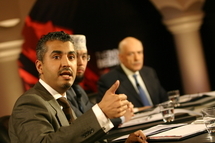 We're not actually grading threats... we're just looking at this one.
We're not actually grading threats... we're just looking at this one.
MAAJID NAWAZ
I don't think we're here to debate other threats. If we were, I would be on your side and say for example that during the so-called "war on terror", cutting back our liberties in the West is a threat. Threatening to imprison people without charge, that I opposed in the UK, is a threat. Invading countries without justification or excuse is a threat. I opposed every one of those motions. We're not here to discuss that motion. What we're here to discuss is the politicisation of Islam and therefore any other religion, and therefore to justify your political aims by utilising religious scripture and discriminating against those who don't happen to fit your narrow world of what religious scripture is.
TIM SEBASTIAN
Let him come back.
AUDIENCE (M)
Well, this leads me to another issue. You seem to have no problem with somebody called Sir John Locke, somebody quotes Tocqueville, somebody quotes any other political philosopher, but the day that a Muslim stands up and quotes what he believes to be the word of God and the word of the messenger of God, you seem to have a problem with that. I find that double standards.
MAAJID NAWAZ
Of course not, of course not. May I remind you that I began this discussion saying Besmi Allah Al Rahman Al Rahim and quoting from the Koran, and what I'm saying is, that's not the problem. Muslims engaging in politics is not a problem. You are not from an Islamist organisation, I know you, and you're not from an Islamist background, so of course when you engage in politics, you engage in politics as an ethical, a religious person, and you follow the standards that are set up in your country. This comes back to the question I've asked the other panel: in the West, what are the tangible aims that you would grant to political Islamists that distinguish them from normal Muslims who engage in politics?
SARAH JOSEPH
Why not allow their faith to enter their political arena.
MAAJID NAWAZ
That's me, I'm doing that.
SARAH JOSEPH
No.
SHADI HAMID
Maajid, the extremist groups that you often refer to in the Western context are a very, very small minority. Hizb ut-Tahrir only has an estimated, can I just say something?
YAHYA PALLAVICINI
They are dangerous.
TIM SEBASTIAN
Okay, let him reply, please, please, Imam, let him reply.
SHADI HAMID
Hizb ut-Tahrir has around 8,500 people in England. We're talking about one ten-thousandth of the British population, we're talking about very small groups of people. Are they a threat to what we stand for in the West, are they a threat to our values? We're not going to let a few people pamphleting outside be a threat to what we stand for because we ...
MAAJID NAWAZ
What are the tangible aims that set aside Islamists from normal Muslims engaging in politics? Why should they be given a special privilege to have religious...? What are those aims.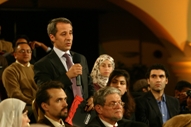 TIM SEBASTIAN
TIM SEBASTIAN
All right. Thank you very much, we're going to move on.
SARAH JOSEPH
No, no.
TIM SEBASTIAN
No, please, please.
SARAH JOSEPH
It's an incredibly important point that his organisation and Maajid ...
TIM SEBASTIAN
It's a point which has been made before.
SARAH JOSEPH
No, no, it hasn't been made before, because there are organisations, so-called Islamist bogeyman organisations ...
TIM SEBASTIAN
That point you have made before.
SARAH JOSEPH
... that want to engage with the government, and he'll be like: "No" and the government has no recommendations disengaged.
TIM SEBASTIAN
We're moving on to a question. The gentleman up there. You have a question.
AUDIENCE (M)
I completely agree with the motion of the house that political Islam is a threat to the West...
TIM SEBASTIAN
Excuse me, where are you from?
AUDIENCE (M)
I'm from Singapore. At the heart of the political Islam, the ideology of the political Islam is a deviated ideology that has the concept of Al Wala' Wal Bara (love and hate for Allah's sake) which is loyalty to the Muslims and aversion to the West. That cannot be something that Islam accepts. It definitely will be a threat to the West.
SHADI HAMID
That's not accurate, that's not accurate. I explained how Islamists are increasingly reaching out to the West and even the US government. They want to talk to us in the West so your statement just isn't correct.
AUDIENCE (M)
That's what they say now, but when they get to become the leaders in the government, they will change ...
SHADI HAMID
How do you know that? In Turkey we have Islamists in power and they're one of America's closest allies.
TIM SEBASTIAN
Okay, please, don't all talk at once. You've made your statement, thank you very much. I'm going to take just one final question. The lady in the fifth row back there, you have your hand up, yes, you.
AUDIENCE (F)
My name is Rima and I'm Palestinian. I think that the point is that Islam is part of our life and that's who we are and we can't change that, and I think that our issues with the West - it's not that Islam is political or not political, we always have issues about Islam with the West even if it's not political. The question is, do you think that Islam is political parties, or if we have a moderate Islamic party, will you have an issue with that or not?
MAAJID NAWAZ
Okay, thank you for your question. Because I am yet to hear what I consider a satisfactory answer to my question posed to the other panel, being: what are the aims of a political Islamist party in the West that would distinguish them from a normal Muslim engaging in politics, I'd answer your question by saying that any religious interpretation, whether it be literalist or moderate, if it is enforced upon others, I have a problem with it, because Islam for 1400 years left the practice of Islam to individuals. Imam Malik refused for his al-Muwatta to become state legislation. Muslims never had a clergy and we never had institutionalised Islam throughout our history. It's a modernist, irreligious manifestation, this call to implement, so in answer to your question, even if somebody considered that the niqab or the face veil is not wajid or obligatory but only the headscarf, what I object to is that he will then force that moderate interpretation on all of those women such as yourself who don't even wear the headscarf.
TIM SEBASTIAN
Okay, Maajid Nawaz, we're running out of time and I want to get a brief comment from Sarah Joseph.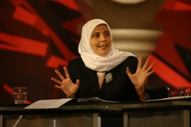 MAAJID NAWAZ
MAAJID NAWAZ
Right. Can I just finish very quickly? I ask you all that your vote will send a message to Westerners who are not Muslim that there is no Muslim takeover of Europe, we are normal citizens. Please send them a clear signal that they have nothing to fear from Muslims who are not in Europe to implement the sharia on them.
TIM SEBASTIAN
That's it, Sarah Joseph, very briefly.
SARAH JOSEPH
We don't fear in the West, you know, with the West it's something strong and it's not going to capitulate to terrorists, and we're all against terrorists, we're all against extremists. That is not what this motion is about. This is about whether we have the right to self-determine. We have the right, as Muslims, to bring what we believe to the table, to frame our governments about what we feel we can give, that we can bring a spiritual dimension to this world. It's not about enforcement, the Koran's quite strict that there's no compulsion in religion, but we can bring the beauty of Islam. You've painted an ugly picture of Muslims who want to bring something political. I want you to think of a beautiful picture. Political Islam can be whatever we want it to be and let it be something good and vote against this motion.
Vote result
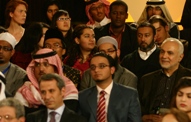 All right, and now, ladies and gentlemen, we're at that point where we're going to vote on the motion, that "This House believes that political Islam is a threat to the West." Let me just explain the voting machines. If you want to vote for the motion, that is the side represented by Maajid Nawaz and Imam Pallavicini, you press button one, the ‘yes' button. If you want to vote against the motion the side represented by Sarah Joseph and Shadi Hamid, you press button two, the ‘no' button, and would you please press whichever button you want to press now. You only have to do that once and through the wonders of modern science, your vote will be communicated immediately to our computers and we should have the result for you in just over twenty seconds' time..... Here we are, the votes should come up. 49 percent for the motion, 51 percent against. The motion has been narrowly defeated. Ladies and gentlemen, it just remains for me to thank our panellists who've come a long way, thank you very much for being here tonight. Thank you to you, the audience. The Doha Debates will be back again in a month's time. Till then, from all of us on the team, have a safe journey home. Good night.
All right, and now, ladies and gentlemen, we're at that point where we're going to vote on the motion, that "This House believes that political Islam is a threat to the West." Let me just explain the voting machines. If you want to vote for the motion, that is the side represented by Maajid Nawaz and Imam Pallavicini, you press button one, the ‘yes' button. If you want to vote against the motion the side represented by Sarah Joseph and Shadi Hamid, you press button two, the ‘no' button, and would you please press whichever button you want to press now. You only have to do that once and through the wonders of modern science, your vote will be communicated immediately to our computers and we should have the result for you in just over twenty seconds' time..... Here we are, the votes should come up. 49 percent for the motion, 51 percent against. The motion has been narrowly defeated. Ladies and gentlemen, it just remains for me to thank our panellists who've come a long way, thank you very much for being here tonight. Thank you to you, the audience. The Doha Debates will be back again in a month's time. Till then, from all of us on the team, have a safe journey home. Good night.
Watch online

